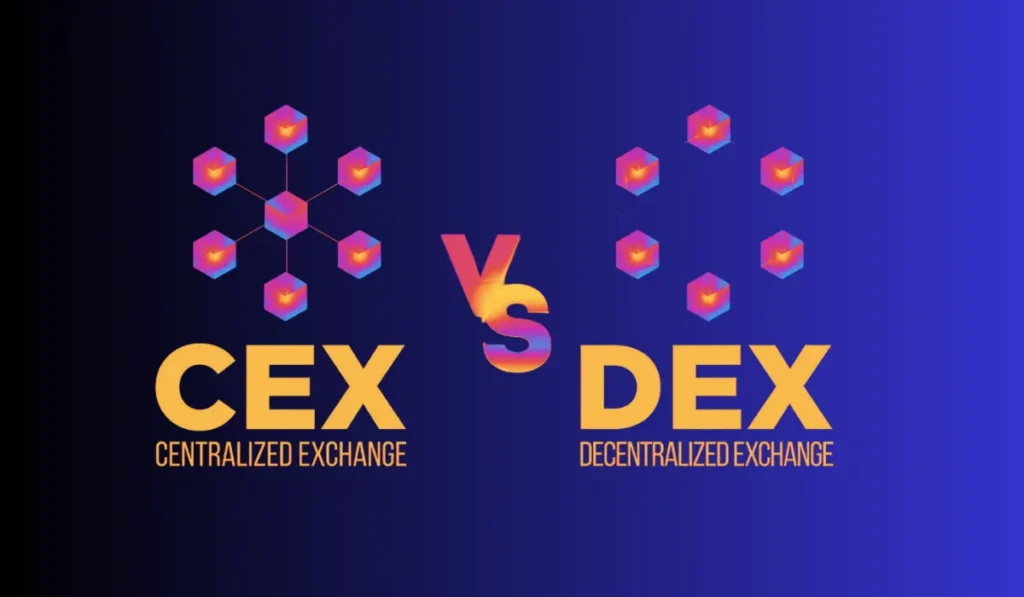Decentralized Exchanges (DEXs) Vs Centralized Exchanges (CEXs) in 2025: Which is Better?

In the crypto world, you often hear about decentralized exchanges (DEXs) and centralized exchanges (CEXs). Ever wondered which is the better option to trade in 2025?
If you are baffled by the numerous features of DEXs and CEXs and find it difficult to decide which is better for you, don’t worry. We got you covered.
Here is a comprehensive comparison between DEXs and CEXs to empower you to make informed decisions. Before delving into the comparison, let’s start from the basics.
What is a Crypto Exchange?
Crypto exchanges are the platforms that facilitate the exchange of cryptocurrencies for fiat money or other digital assets. You can learn more about crypto exchanges in our detailed guide
To put it simply, the crypto exchanges connect crypto sellers and buyers and work like a stock exchange.
The crypto exchanges are either centralized (CEXs) or decentralized (DEXs). Both have their advantages and disadvantages.
The CEXs are controlled by a single entity, like a company; on the other hand, decentralized systems have distributed control similar to blockchain technology. Coinbase, Kraken, KuCoin, and OKX are some of the famous centralized exchanges. Dolomite and Serum are examples of decentralized exchanges.
Here is a detailed comparison between CEXs and DEXs to help you decide which is best for you.
Decentralized Exchanges (DEXs) Vs Centralized Exchanges (CEXs)
1. Custody of Funds
In the case of centralized exchanges, you need to entrust the funds to the exchange. The custody of your digital assets and managing the private keys are done by the exchange itself.
As for decentralized exchanges, you are in complete control of your digital assets.
2. Ease of Use
The centralized exchanges have higher user friendliness and customer support. Hence, they are more appealing to beginners.
For decentralized exchanges, you need a digital wallet and an understanding of concepts like gas fees. The gas fee is the transaction fee incurred to process transactions or run smart contracts on a blockchain network.
Plus, the customer support is limited in DEXs.
4. Liquidity
The liquidity is high in centralized exchanges due to large trade volumes. This reduces the concentrated risks.
The trade volume is lower in the case of DEXs, further increasing the risk.
5. Selection of Cryptocurrencies
The centralized crypto exchanges generally have a curated list of cryptocurrencies. Hence, has a smaller collection of cryptocurrencies.
The decentralized system has a higher range, as any compatible token can be listed.
6. Privacy
The centralized exchanges come under the jurisdiction of local governments. While registering in the centralized system, the users need to comply with the Know Your Customer and Anti-Money Laundering rules. The process requires the sharing of personal data.
The decentralized system facilitates anonymous transactions. Hence offers higher privacy.
7. Security
In centralized exchanges, all the data is gathered at a single central location. This makes it more vulnerable to large-scale cyber attacks.
On the other hand, decentralized systems do not collect personal data, but the smart contracts associated with DEXs may be vulnerable.
8. Popularity
Due to the increased user friendliness of centralized systems, they are easier to adapt. The decentralized systems required special knowledge to operate, hence less popular among crypto traders.
Despite a lower historical adoption rate, the popularity of DEXs is increasing as the technology backing it is evolving faster.
9. Speed
The Centralized exchanges have higher transaction speed as it is centrally controlled. In decentralized exchanges, the transaction speed is variable depending on the blockchain network.
10. Fiat Currency Integration
The fiat currencies, like the US Dollar, are integrated with centralized exchanges. The decentralized ones have moderate or lower fiat currency integration.
Also Read : Best Cryptocurrency Exchanges
Advantages and Disadvantages of CEXs and DEXs
- CEXs
| Advantages | Disadvanges |
|---|---|
| Higher user friendliness, provides customer support, Higher liquidity, Supports fiat currencySubject to local lawsHigh speed | The assets are in the custody of the exchangesMore vulnerable to cyberattacks. Less privacy. May have a lesser collection of crypto assets |
- DEXs
| Advantages | Disadvanges |
|---|---|
| Higher security, Higher privacy, Large selection of digital assetsFull control over funds | May not have customer support, Lower liquidity, Need technical knowledge to operate, Less beginner-friendly, has Smart Contract vulnerabilities |
Conclusion
The centralized systems are user-friendly, hence more suitable for beginners. They offer higher speed, fiat currency integration, and higher user friendliness.
On the other hand, the centralized exchanges are more vulnerable to cyberattacks. The decentralized system provides increased privacy and security. Plus full control over assets and but it is more suitable for experienced traders.
You can start trading in centralized systems. After gaining experience, it is advisable to diversify according to your individual preferences.
Crypto & Blockchain Expert
